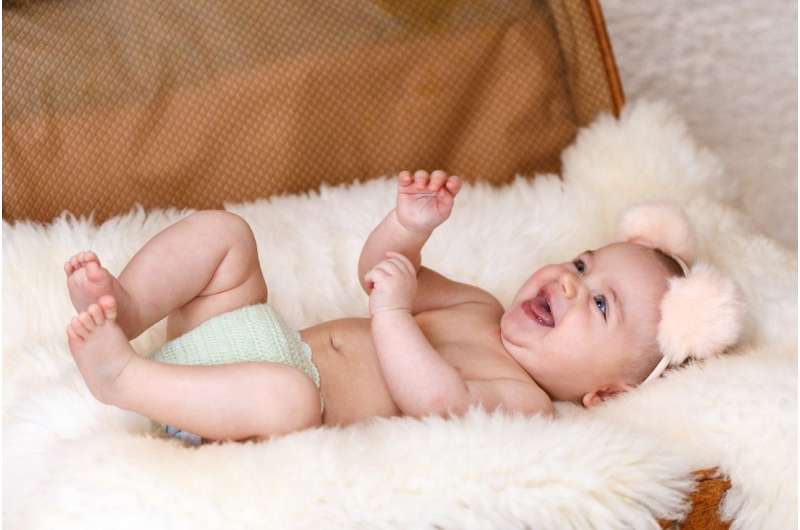How do babies laugh? Like chimps!

Few things can delight an adult more easily than the uninhibited, effervescent laughter of a baby. Yet baby laughter, a new study shows, differs from adult laughter in a key way: Babies laugh as they both exhale and inhale, in a manner that is remarkably similar to nonhuman primates.
The research will be described by Disa Sauter, a psychologist and associate professor at the University of Amsterdam in the Netherlands, during a talk at the Acoustical Society of America's 176th Meeting, held in conjunction with the Canadian Acoustical Association's 2018 Acoustics Week in Canada, Nov. 5-9 at the Victoria Conference Centre in Victoria, Canada.
Along with her colleagues—psychologist Mariska Kret and graduate student Dianne Venneker of Leiden University in the Netherlands, and Bronwen Evans, a phonetician at University College London—Sauter studied laughter clips taken from 44 infants and children between 3 and 18 months of age. The recordings were taken from online videos in which babies were engaged in playful interactions. The recordings were then analyzed by 102 listeners, recruited from a psychology student population, who evaluated the extent to which the laughs in each clip were produced on the exhale versus the inhale.
Sauter and her colleagues found that the youngest babies commonly laughed on both inhalation and exhalation, as do nonhuman primates like chimpanzees. In the older babies studied, however, laughter was primarily produced only on the exhale, as is the case in older children and adults.
"Adult humans sometimes laugh on the inhale but the proportion is markedly different from that of infants' and chimps' laughs. Our results so far suggest that this is a gradual, rather than a sudden, shift," said Sauter, who points out that the transition does not appear to be linked to any particular developmental milestones. She noted, however that these results were based on the judgments of nonexpert listeners. "We are currently checking those results against judgments by phoneticians, who are making detailed annotations of the laughter."
Sauter said that there is no accepted reason why humans, alone among primates, laugh only on exhalation. One possibility, she said, is that it is a result of the vocal control humans develop as they learn to speak.
The researchers currently are examining if there is a link between the amount of laughter produced upon inhalation and exhalation and the reasons why individuals laugh, which also change with age. In infants and younger babies, as in nonhuman primates, laughter occurs as the result of physical play like tickling. In older individuals, laughter can arise from physical play but also from social interactions.
"Beyond that, I'd be interested in seeing whether our findings apply to other vocalizations than laughter," said Sauter. Ultimately, the research could offer insight into vocal production of children with developmental disorders. "If we know what normally developing babies sound like, it could be interesting to study infants at risk to see whether there are very early signs of atypical development in their nonverbal vocalizations of emotion."
More information: The presentation #3aSC5, "How do babies laugh?" by Disa Sauter, Bronwen Evans, Dianne Venneker and Mariska Kret will be Wednesday, Nov. 7, 9:25 a.m. in SALON A of the Victoria Conference Center in Victoria, British Columbia, Canada. acousticalsociety.org/asa-meetings/



















